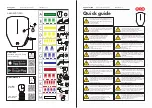
•
Turn off the speed control. The speed control may shut off
automatically when you are towing on long, steep grades.
•
To eliminate excessive transmission shifting, activate the Tow/Haul
feature. This will also assist in transmission cooling. For additional
information, refer to
Automatic transmission operation
in the
Driving
chapter.
•
Anticipate stops and brake gradually.
•
Do not exceed the GCWR rating or transmission damage may occur.
•
Your vehicle may be equipped with a temporary or conventional spare
tire. If the spare tire is different in size (diameter and/or width), tread
type (All-Season or All-Terrain) or is from a different manufacturer
other than the road tires on your vehicle, your spare tire is considered
“temporary”. Consult information on the spare Tire Label or Safety
Compliance Certification Label for limitations when using.
Servicing after towing
If you tow a trailer for long distances, your vehicle will require more
frequent service intervals. Refer to your
scheduled maintenance
information
for more information.
Trailer towing safety tips
General
•
Ensure that the trailer, safety chains and 7–pin electrical connectors
are securely fastened.
•
Make sure the truck receiver, draw bar, and coupler are properly
connected and adjusted.
•
Check rear view and side mirrors for proper visibility especially when
towing trailer wider than the truck.
•
When turning make wide turns to allow trailer tires to properly clear
any obstacles.
•
When towing, operate the vehicle at lower speeds than you would
when not towing a trailer. The likelihood of trailer sway is greater at
higher speeds.
•
Be prepared for trailer sway due to buffeting when larger vehicles
pass in either direction.
•
If you will be towing a trailer frequently in hot weather, hilly
conditions, at GCWR, or any combination of these factors, consider
refilling your rear axle with synthetic gear lubricant if not already so
Tires, Wheels and Loading
260
2010 F-250/350/450/550
(f23)
Owners Guide, 2nd Printing
USA
(fus)
















































